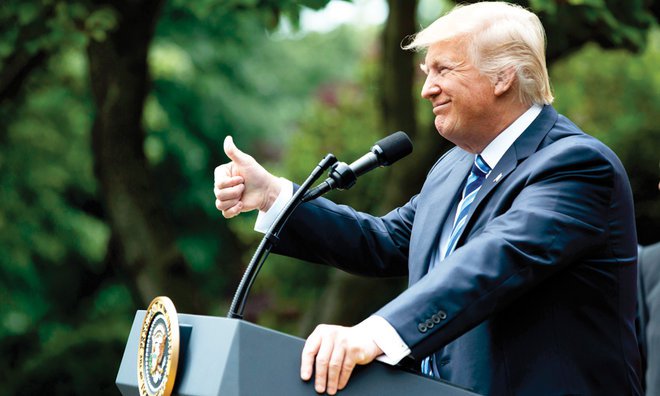Saudi Arabia to be Trump’s 1st stop on first foreign trip
05:45AM Fri 5 May, 2017

WASHINGTON, May 4,2017 (ArabNews): Promoting an agenda of “tolerance,” “burden sharing” and “countering both Iran and Daesh,” senior US officials announced that Saudi Arabia will be the first stop for US President Donald Trump on his debut foreign visit since taking office in January.
This is the first time ever that a US president has made Saudi Arabia a first stop on a maiden foreign trip after taking office.
The visit is expected to take place in late May and will convene in Riyadh in a Muslim leaders’ summit with Trump, according to US officials who briefed reporters on condition of anonymity.
From Saudi Arabia, Trump will travel to Israel, and then to the Vatican where he will meet Pope Francis.
Trump is expected to travel to Brussels to participate in North Atlantic Treaty Organization’s (NATO) summit. He will conclude the trip by attending the G-7 summit in Italy on May 26-27.
In announcing his trip from the Rose Garden at the White House, Trump stressed a message of “tolerance is the cornerstone of peace.”
He said: “That is why I am proud to make a major and historic announcement this morning and share with you that my first foreign trip as president of the United States will be to Saudi Arabia, then Israel, and then to a place that my cardinals love very much, Rome.”
Trump said he hoped to lay “a new foundation of cooperation and support with our Muslim allies to combat extremism, terrorism and violence, and to embrace a more just and hopeful future for young Muslims in their countries.” Trump referenced a more flexible foreign policy in dealing with governments in the region. “Our task is not to dictate to others how to live but to build a coalition of friends and partners who share the goal of fighting terrorism and bringing safety, opportunity and stability to the Middle East,” he said.
“This is the first country the US president visits on his tour of the region, also his first, which attests to the importance attached to Saudi Arabia,” Hamdan Al-Shehri, a Riyadh-based Saudi political analyst, told Arab News on Thursday.
“It sends the strong message that the Saudi-US relations are solid and that the two sides are keen to boost cooperation, especially in view of the more recent political and military developments in the Middle East,” he added.
He noted that the two sides will discuss several issues of common concern, including the Syrian crisis and the important role Saudi Arabia has been playing in trying to find a political solution to it.
The situation in Yemen and the Iranian intervention in the region, by supporting the Houthi militias in Yemen and the Syrian regime, which is a major contributor to the spread of terrorism, are also hot topics the two sides are expected to discuss during the visit, said Al-Shehri.
“Deputy Crown Prince Mohammed bin Salman’s earlier visit to the US no doubt contributed to shaping the US approach to the Middle East.
During his visit, the deputy crown prince highlighted the opportunities the previous US administration wasted to address the crises in the region and put things back on track, particularly that now, there is need for a stronger US political involvement to balance the Russian and other countries’ presence in the region,” he said. US senior officials in a briefing about the visit said planning for trip to Saudi Arabia “started after the election” in November. They referenced a “big opportunity” and “new page of engagement” between the US and its Arab partners.
One official said Arab allies have shown “eagerness” to work with Trump and had felt “being abandoned” under his predecessor, Barack Obama, with a sense “that the US is withdrawing from the region.”
The officials promised a more robust US engagement focused on countering both Iran and Daesh, and fostering “tolerance among the three religions,” which explains the first three stops in Muslim, Jewish and Christian holy places.
“What this trip will show is that the president, as he lays out his agenda, America First, is fully compatible with American leadership in the world,” stressed one official.
The Trump administration did not close the door on a possible trilateral summit in Jerusalem between Trump, Israeli Prime Minister Benjamin Netanyahu and Palestinian President Mahmoud Abbas. It would mark the first such meeting since peace negotiations were brought to halt in 2014.
The White House statement announcing the visit said: “President Trump has accepted the invitation of King Salman bin Abd Al-Aziz, the Custodian of the Two Holy Mosques, to visit the Kingdom of Saudi Arabia later this month.”
It added that “the visit will reaffirm the strong partnership between the United States and Saudi Arabia and allow the leaders to discuss issues of strategic concern, including efforts to defeat terrorist groups and discredit radical ideologies.”
The statement said while in Israel Trump “will discuss a range of regional issues, including the need to counter the threats posed by Iran and its proxies, and by ISIS (Daesh) and other terrorist groups.”
Visiting Israel on the first trip also marks a reversal from Obama who visited Turkey, Saudi Arabia, Iraq and Egypt in the first year in 2009.











